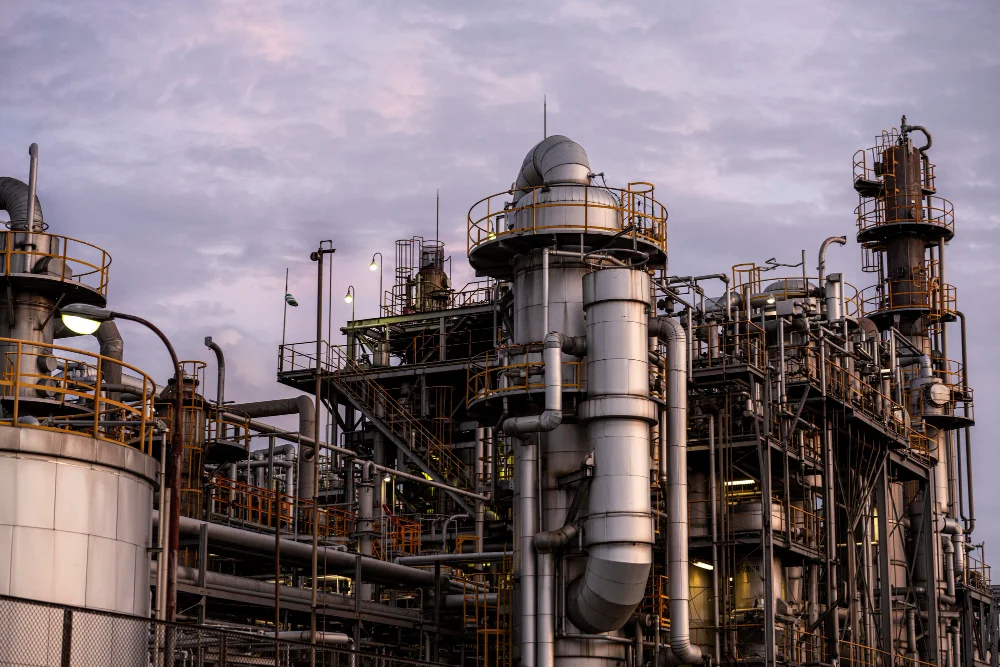Petroleum refining is a complex process that involves handling various chemical fluids. Efficient management of these fluids is crucial for ensuring safety, minimizing environmental impact and optimizing refinery operations.
The refining process is complex and involves a variety of steps, including:
Distillation: Crude oil is heated and vaporized, and the vapors are then condensed into different fractions based on their boiling points.
Conversion: The different fractions are then converted into more useful products, such as gasoline, diesel fuel, and jet fuel.
Treatment: The converted products are then treated to remove impurities and improve their quality.
Efficient chemical fluid handling is essential for the petroleum refining process. The ability to safely and efficiently transport & store the different chemical fluids involved in the process is critical to the success of the refinery.
Factors Contributing Efficient Fluid Handling
There are a number of factors that contribute to efficient chemical fluid handling in a refinery, including:
Right Equipment: The right type of equipment is essential for safely and efficiently transporting and storing chemical fluids. For example, Sulfuric acid pumps are used to circulate the acid within the alkylation unit, ensuring proper mixing and contact between the acid and hydrocarbon feedstock.
Proper Procedures: Proper procedures must be in place to ensure that chemical fluids are handled safely and efficiently. These procedures should cover everything from the loading and unloading of tankers to the storage and disposal of waste.
Training: Personnel who work in a refinery must be trained in the safe handling of chemical fluids. This training should cover everything from the identification of different fluids to the proper use of safety equipment.
Before diving into efficient handling practices, it’s essential to understand the types and characteristics of chemical fluids used in petroleum refining. These fluids can include catalysts, solvents, acids and alkalis, each with unique properties and roles in the refining process. Understanding their behavior, reactivity and potential hazards is vital for safe and efficient handling.
Safety Considerations for Chemical Fluid Handling
Safety should always be the top priority when dealing with chemical fluids in petroleum refining. Implementing proper safety protocols, such as wearing personal protective equipment (PPE) and conducting thorough hazard assessments, is critical. Additionally, establishing clear procedures for spill response, containment, and emergency shutdowns can prevent accidents and protect workers and the environment.
Acids Handled by Pumps in Petroleum Refineries
Hydrochloric Acid (HCl): Hydrochloric acid is occasionally used in refining processes for descaling or acid cleaning of equipment and pipelines. Pumps designed to handle corrosive fluids like HCl are employed for safe and efficient transport and circulation.
Sulfuric Acid (H2SO4): Sulfuric acid is used in alkylation or catalyst regeneration process. Sulfuric acid pumps are capable of handling corrosive fluids like sulfuric acid for the safe and efficient transport, circulation and mixing of the acid within the refinery.
Phosphoric Acid (H3PO4): Phosphoric acid may be used in specific applications within a refinery such as catalyst preparation. Phosphoric acid pump ensure proper circulation and distribution of the acid during these processes.
Nitric Acid (HNO3): Nitric acid may be encountered in metal surface treatment. Nitric acid pumps are utilized for safe and efficient transport, circulation and distribution of the acid within the refinery.
Best Practices for Efficient Chemical Fluid Handling
Efficient handling of chemical fluids in petroleum refining can be achieved through various strategies. Firstly, optimizing fluid transfer and circulation processes by designing efficient flow paths and minimizing unnecessary transfers can significantly improve efficiency. This approach reduces the risk of contamination, saves energy and minimizes the potential for fluid loss or leakage.
Employing accurate monitoring systems to track fluid levels, pressure and temperature is crucial. Real-time data allows for proactive adjustments, ensuring optimal operating conditions and preventing system failures. By promptly identifying and addressing any deviations or abnormalities, potential issues can be mitigated, maintaining the efficiency and reliability of the fluid handling process.
Proper blending and mixing techniques should also be implemented to ensure homogeneous compositions. Thorough blending and mixing enhance the efficiency of chemical reactions, promote consistent product quality and minimize variations. By employing precise control and monitoring, the desired chemical reactions can be facilitated, resulting in improved process efficiency and higher-quality end products.
Efficient chemical fluid handling is a critical aspect of refineries. By understanding the properties of chemical fluids, prioritizing safety, implementing best practices, and leveraging advancements in technology, refineries can achieve improved operational efficiency, cost savings, and environmental stewardship. Continuous education, training, and sharing of knowledge within the industry will drive further progress in handling chemical fluids efficiently, ensuring a sustainable and successful future for petroleum refining.


Videos